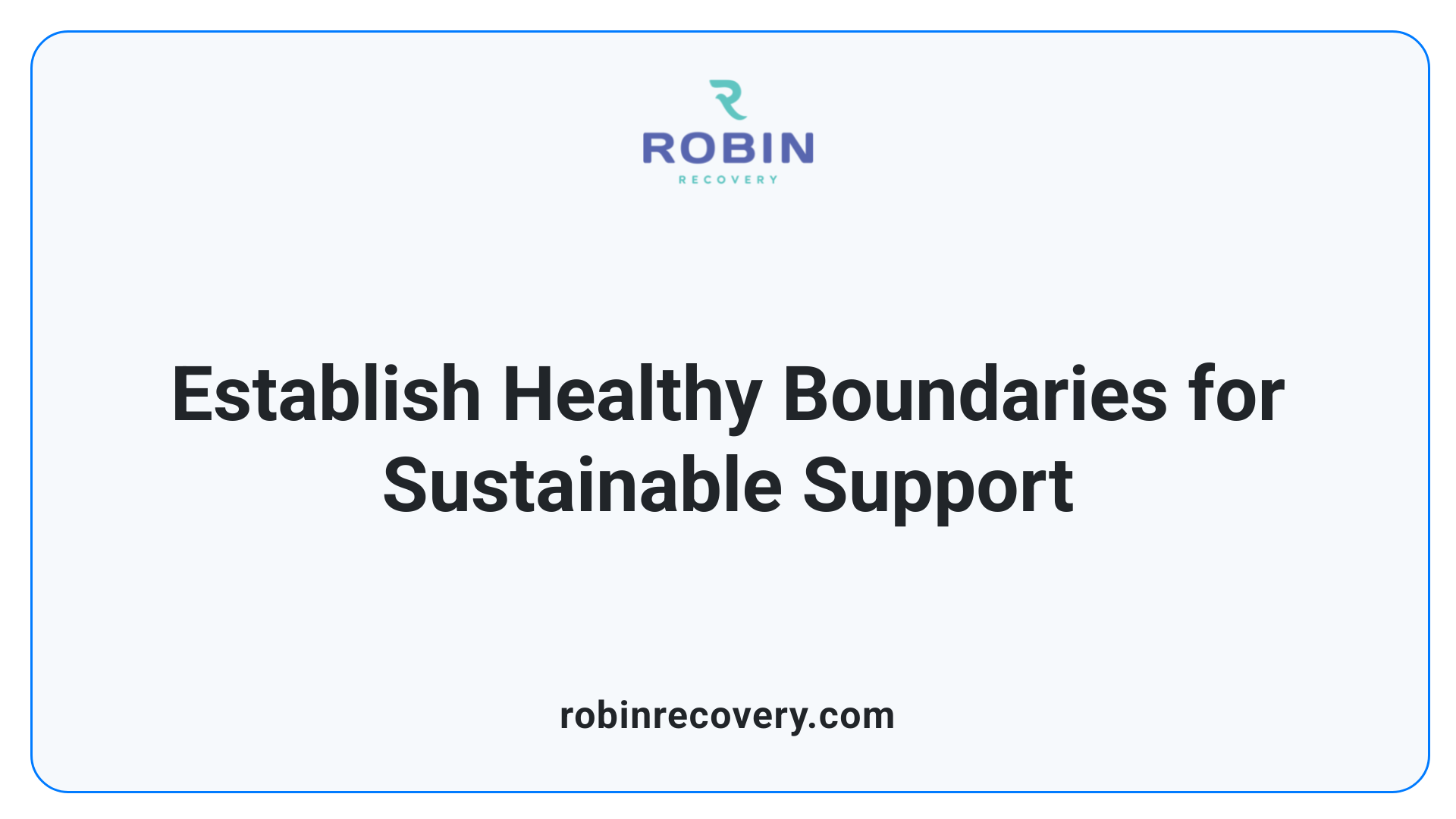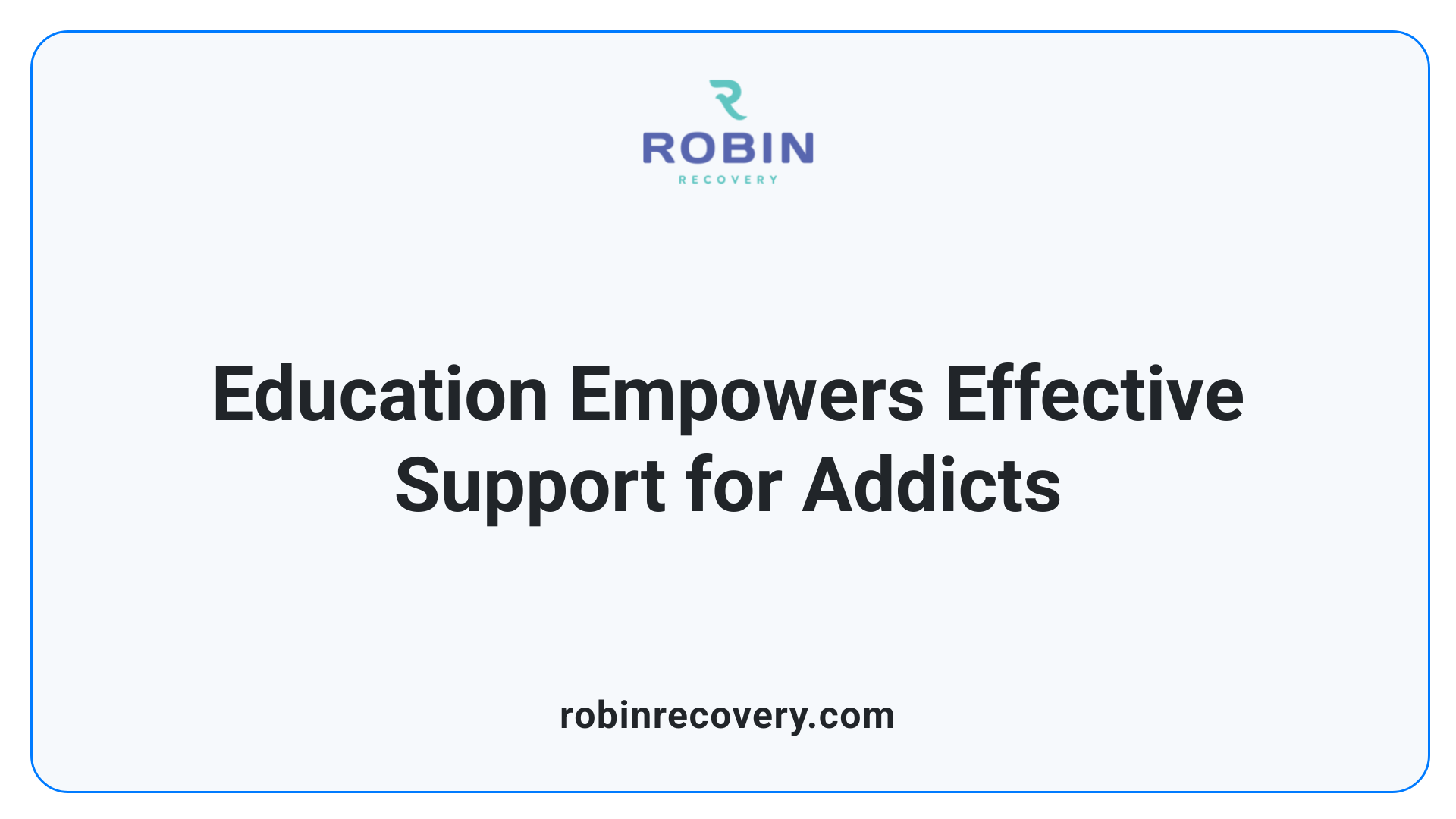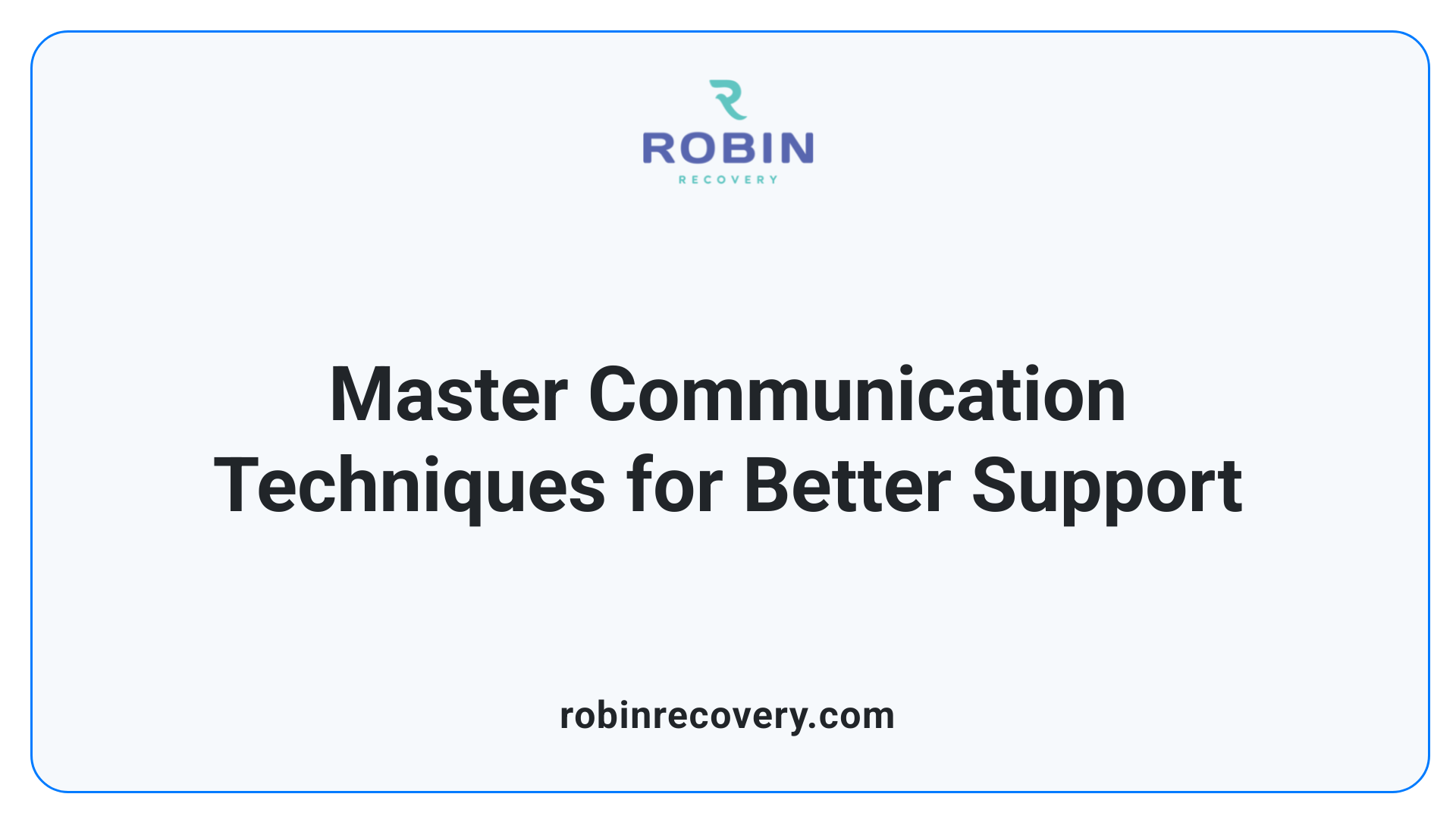How to Support a Loved One Without Enabling Their Addiction

Understanding the Role of Support in Recovery
Navigating the complexities of supporting a loved one with addiction requires a delicate balance between providing helpful support and avoiding enabling behaviors. Families often face the challenge of standing by those struggling with substance use without crossing lines that could inadvertently encourage the addiction to persist. This guide aims to help readers differentiate between enabling and supporting, offering practical tips and emotional insights that are crucial for positive outcomes in recovery.
Understanding Enabling Behavior

Definition of enabling behavior
Enabling behavior refers to actions that contribute to another person's self-destructive habits, often without the enabler realizing the negative impact of these actions. This behavior creates a safety net for the individual struggling with addiction, allowing them to evade the consequences of their actions. Ultimately, enabling hinders recovery and prolongs the addiction cycle.
Examples of enabling behaviors
Common examples of enabling behaviors include:
- Making excuses: Justifying the addict's behavior or minimizing the seriousness of their addiction to others.
- Providing financial support: Giving money that may be used to sustain addictive behaviors, such as buying substances.
- Ignoring harmful actions: Allowing the person to continue their detrimental behaviors without addressing the impact.
- Bailing them out: Frequently rescuing them from legal or financial troubles that arise from their addiction.
- Taking over responsibilities: Managing their tasks to prevent them from facing the consequences of their actions.
How can I differentiate between enabling and supporting an addict?
Differentiating between enabling and supporting an addict involves recognizing the impact of your actions on their recovery journey. Enabling behaviors, such as making excuses or shielding a loved one from the consequences of their addiction, prevent them from experiencing accountability and hinder their motivation to change. In contrast, healthy support encourages the individual to confront their addiction, set boundaries, and take responsibility for their actions. Techniques like "detachment with love" emphasize the importance of self-care for loved ones and promote allowing the addict to face natural consequences. Ultimately, it’s crucial to assess your behaviors and intentions to ensure that your support fosters recovery rather than perpetuates addiction.
The Dynamics of Family Roles in Addiction

What are the six family roles in addiction?
Understanding the roles family members take on in the context of addiction can provide valuable insights into the family dynamics involved. The six distinct roles are:
- The Addict: The individual struggling with substance use.
- The Scapegoat: Often blamed for family problems, this person may act out in response to stress.
- The Mascot: Uses humor to reduce tension, often masking deeper issues.
- The Lost Child: Quiet and withdrawn, this member usually tries to stay out of the conflict.
- The Caretaker: Takes on the responsibility of managing the family’s needs, often at the expense of their own well-being.
- The Hero: This person provides a facade of success and stability, striving to maintain the family’s image.
How do these roles impact family dynamics?
Each role has a significant influence on family interactions, often enabling the addict's behavior unconsciously. For example:
- Enabling behaviors may arise, where caretakers may excuse the addict's actions, while heroes attempt to maintain stability at all costs.
- Families can fall into a recurring pattern, misinterpreting the dynamic as protective when it perpetuates the addiction cycle.
- Many family members may experience emotional distress, feeling trapped between love for the addict and the need for self-preservation.
By recognizing these roles, families can seek to shift their dynamics towards a more supportive environment that encourages recovery.
Setting Healthy Boundaries

Importance of boundaries
Setting healthy boundaries is vital for anyone supporting a loved one with an addiction. Boundaries help create a safe environment for both the supporter and the person in recovery.
These boundaries clarify expectations, reduce confusion, and prevent enabling behaviors that can prolong addiction. They also empower the loved one by encouraging responsibility for their actions.
How to set and maintain boundaries
To set and maintain boundaries effectively, consider the following steps:
- Identify enabling behaviors: Recognize actions like making excuses or providing financial support that contribute to the addiction.
- Determine acceptable limits: Define what is acceptable in your relationship, like refusing to engage with destructive behaviors or setting rules about substances in the home.
- Communicate clearly: Use "I" statements to express your feelings about their behavior, avoiding blame and encouraging dialogue.
- Be consistent: Follow through on the boundaries you set, ensuring there are consequences for crossing them.
- Encourage professional help: Encourage your loved one to seek treatment and support, such as therapy or support groups.
Focusing on these strategies not only protects your well-being but also supports your loved one’s recovery journey.
The Role of Education in Addiction Support

Importance of Educating Oneself
Understanding addiction is key when supporting a loved one. By educating yourself on substance use disorders, withdrawal symptoms, and treatment options, you gain crucial insights into your loved one's struggles. Awareness of how addiction alters brain functions helps you approach the situation with empathy rather than judgment.
How Education Aids in Effective Support
When family members are knowledgeable about addiction, they can distinguish between supportive actions and enabling behaviors. For example, learning that providing financial support may inadvertently fuel addiction allows families to adjust their approach.
Being informed also enhances communication. Effective dialogue can occur when discussing addiction in a non-stigmatizing way, encouraging openness from your loved one. Moreover, education helps family members set healthier boundaries, allowing them to assist without sacrificing their own well-being.
Support groups, literature, and professional guidance can be excellent sources for this education, ultimately leading to a more robust support system for recovery.
Communication Strategies for Support

Effective communication techniques
When supporting a loved one struggling with addiction, effective communication is essential. Using 'I' statements, such as "I feel worried when I see you using substances," creates a dialogue that expresses your feelings without placing blame. This approach fosters a more open conversation.
Additionally, active listening is crucial. Allow your loved one to share their thoughts and feelings without interruption. Validate their feelings, showing empathy for their struggles, which can encourage them to respond more positively to your concerns.
Avoiding stigmatizing language
It's vital to avoid language that stigmatizes or labels your loved one. Rather than calling them an "addict," address the issue directly by referring to their behaviors. This approach helps maintain their dignity and encourages a focus on recovery rather than identity.
When discussing addiction, steer clear of past mistakes and instead emphasize current goals for recovery. Supportive communication promotes a loving environment, reducing tensions that can hinder progress.
Participating in Therapy and Support Groups
What steps can I take to help a loved one in addiction recovery without enabling them?
To support a loved one recovering from addiction without enabling their behavior, it is crucial to focus on creating healthy family dynamics. Participating in family therapy plays a vital role in this process. It encourages open communication, providing a safe space to address underlying issues and enabling family members to voice their concerns. In therapy, families can learn to differentiate between their loved one's identity and their behaviors, fostering empathy while holding them accountable.
Benefits of Family Therapy
Family therapy can significantly benefit those affected by a loved one's addiction:
- Improved Communication: Family members learn effective ways to express themselves while avoiding blame.
- Understanding Dynamics: Recognizing codependency or enabling behaviors can help the family units break unhealthy patterns.
- Mutual Support: Therapy can build a support system where all members feel heard and validated.
Value of Support Groups
Furthermore, support groups like Al-Anon or Nar-Anon offer a community for families struggling with addiction. In these groups, individuals can share experiences, gain insights, and receive guidance from others who understand similar challenges.
- Shared Experiences: Participants learn they are not alone, which can reduce feelings of isolation.
- Accountability and Resources: Support groups provide ongoing accountability and resources to help families maintain boundaries and promote recovery throughout the healing journey.
By combining family therapy and participation in support groups, families can create a supportive atmosphere that enhances recovery without enabling addictive behaviors.
Encouraging Responsibility and Accountability
Importance of personal accountability
Fostering a sense of personal accountability in a loved one struggling with addiction is essential for their recovery journey. When individuals acknowledge their role in their addiction, they become empowered to take charge of their recovery. Encouraging them to accept responsibility helps cultivate self-awareness and can motivate them to seek professional help. It may start with small steps, like managing daily tasks without dependence on family support, which reinforces their independence and accountability.
Consequences of avoiding accountability
Conversely, avoiding accountability can lead to prolonged addiction and hinder the recovery process. If family members constantly shield their loved one from consequences—such as making excuses or providing financial support—this creates an enabling environment. This lack of responsibility can diminish the person’s motivation to change and seek treatment. Allowing them to face the repercussions of their actions can spur growth and encourage necessary changes in their behavior.
Self-Care for Supporters
Importance of Self-Care
Supporting a loved one battling addiction can be emotionally and physically draining. It’s crucial for supporters to prioritize their own well-being amidst the chaos. Taking time for personal care allows caregivers to recharge and build resilience. Neglecting self-care can lead to burnout, increasing feelings of guilt or frustration, which may inadvertently lead to enabling behaviors.
How Self-Care Supports the Recovery Process
Practicing self-care not only benefits the supporter but also creates a healthier environment for the individual struggling with addiction. When caregivers engage in self-care, they are better equipped to set boundaries, communicate effectively, and provide balanced support. This could involve attending support group meetings like Al-Anon or engaging in therapy, ensuring that both parties can approach recovery with a clear mind and a strong emotional foundation.
Incorporating simple self-care practices such as exercise, meditation, or even hobbies can significantly enhance a supporter’s ability to manage stress. By modeling healthy behaviors, caregivers also inspire their loved ones to take responsibility and seek help.
Self-Care Activities Benefits for Supporters Benefits for the Loved One Regular exercise Reduces stress Sets a positive example for healthy habits Attending support groups Provides community support Encourages openness to treatment and discussion Personal therapy sessions Helps process emotions Promotes healthy communication and boundaries
Seeking Professional Help
Importance of professional intervention
Professional intervention is essential when dealing with a loved one's addiction. It provides a structured approach to encourage an individual to seek help while preventing family dynamics from enabling continued substance use. With trained professionals, family members can navigate the emotional challenges of addiction more effectively.
How professionals can aid recovery
- Assessment and Guidance
Professionals can assess the addiction's impact on both the individual and the family, offering tailored advice on the best treatment options. - Structured Support
Counselors or interventionists can facilitate family meetings, providing a safe space to express concerns without escalating conflicts. - Skill Development
Professionals teach families how to communicate effectively, set boundaries, and reduce enabling behaviors that hinder recovery. - Crisis Management
A trained interventionist can help coordinate an intervention, ensuring it is carried out with care and without coercion. - Ongoing Support
Continued professional support helps family members process their feelings and maintain healthy dynamics during the recovery journey.
Using professional help, families can transform the chaos of addiction into a pathway toward healing and recovery.
Embracing a Balanced Approach
Supporting a loved one through addiction recovery requires resilience, compassion, and a consistent approach that prioritizes both their journey to sobriety and your own well-being. By setting boundaries, fostering open communication, and participating actively in therapy and support groups, families can navigate the challenges of addiction without enabling harmful behaviors. Education, self-care, and professional guidance are vital components in crafting a supportive yet disciplined environment that encourages recovery and long-term success for everyone involved.
References
- How to Help an Addict Without Enabling - Peace Valley Recovery
- How to Detach: Love An Addict Without Enabling
- How to Support Someone in Recovery Without Enabling
- How to Help an Addict That Doesn't Want Help
- Signs You're Enabling a Loved One's Addiction - WebMD
- 4 Key Ways to Support an Addict Without Enabling
- 7 tips for supporting someone recovering from addiction
